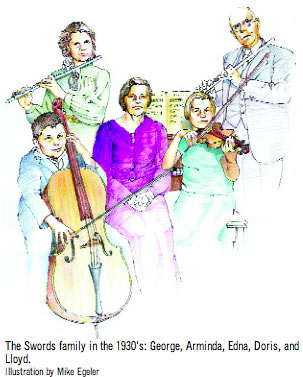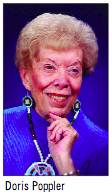Blazing Trails

Doris Swords Poppler backs her red Sunfire convertible out of her Billings garage early most mornings. On Mondays she breakfasts with members of the Billings City Council. As the city’s deputy mayor, she’ll return for the council meeting later that evening. Tuesdays she has a 7 a.m. hair appointment, and Wednesdays there’s choir practice at the Congregational Church. Friday mornings she joins the city administrators for a meeting with the mayor.
Then there are meetings with the Community Housing Board, the Guardianship Council, trustees for Rocky Mountain College, consultations on Indian gaming laws, the Bar Association, monthly bridge games with women friends, and lunches at the Petroleum Club with the Barristers, a long-standing group of Billings attorneys. Doris is the only female member of the Barristers. But being “the only female” has never stood in her way. Little has. She’s blazed countless trails in her seventy-eight years and has been the point person for many folks along the way—even a President of the United States.
After high school graduation, Doris set off for the University of Minnesota, but recruiting posters and the movies lured her to join the WAVES following her sophomore year. Her older sister, Army (short for Arminda), had already joined the women’s Marine Corps after a brief stint at UM. “I felt like I’d been sent to heaven,” Doris recalls, remembering her years in the military. “Few men were still in college and suddenly, there were 4,000 sailors to 200 WAVES!”
Following the war, Doris used the G.I. Bill to pay her fees at UM. Law was in her blood; her father, Lloyd Swords, received his law degree from UM in 1923, and her grandfather, George Swords, had been an attorney in Iowa. Her father had practiced law with Wellington Rankin ’03 in the 1920s, “prosecuting the bootleggers,” Doris says. “Law school Dean Charles Leaphart just liked me for some reason,” she says, “and allowed my military service to stand in for my final two years of college.” Doris was admitted to law school—one of only two women in the school and the only woman to graduate with her class in 1948. “I had to study very hard,” Doris recalls. “All the men in my class were vets except one. They were so serious. After the war, they were no longer boys. I thought if I even take a deep breath, I’ll never make it.”
Doris did pledge Alpha Chi Omega, the sorority her mother, Edna Mowre Swords, had chartered on UM’s campus in 1923. (Doris’ father chartered the Alpha Tao Omega house on campus that same year.) Arminda had been an Alpha Chi Omega while at UM. “Army had much too much fun, though,” Doris laughs, “and only stayed at UM one quarter. She was a knockout—‘the pretty one.’ I was always ‘the smart one.’ But, I was the smartest and the prettiest one in my law class!”
Dancing also helped balance the rigors of law school. “I loved to dance,” she continues, “and my dream man then was tall and blond and loved to dance, too.” In her law school class photo a handsome, dark-haired Louis Poppler stands just behind Doris and to her right. Lou couldn’t dance and certainly wasn’t blond, but he swept Doris off her feet. They were married in 1949, just months after graduation. Pregnant the first year of marriage, Doris hoped she could practice law after their son, Louis, was born. Soon, however, she was pregnant with Kristine, followed quickly by Mark, Blaine, and Claire. Four years later, daughter Arminda arrived.
For twenty-three years Doris put her legal practice on hold, immersing herself in raising six children, serving on community boards, church, PTA, Junior League, volunteering for countless civic organizations—often as an officer—and suddenly, becoming number one point person for her husband, Lou. A Montana handball champion who ran ten miles a day, Lou was diagnosed with Lou Gehrig’s disease in 1969. Doris was determined that she and the children could care for him at home. An indoor lift was installed to get him up the stairs. Mark and Blaine arranged their high school schedules so they could drive their father to work, to his daily lunch at the Petroleum Club, back to his office, and then home in the evening—a schedule they upheld even on the day he died. The same year that Lou’s illness struck, Doris was diagnosed with breast cancer and underwent a mastectomy. “It never crossed my mind that I’d die,” she admits. “I didn’t have time to die.”

Lou died in May 1972 and Doris prepared to volunteer at the county attorney’s office when her children returned to school that fall. She was hired as an attorney, however, as unbeknownst to Doris, for twenty-two years Lou had annually renewed her law license when he renewed his own. At work Doris met deputy county attorney Diane Barz, J.D. ’68, and the women became fast friends. Within months they’d formed the first women’s law firm in the Northwest. Diane later became the first woman to sit on the Montana Supreme Court and currently is a district court judge in Billings.
Doris and Diane borrowed $10,000 and set up law offices in downtown Billings. These were good years for Doris. The law firm was a success from the beginning, their first customer, a corporation. Doris’ stamina, organizational and negotiating skills (ask any mother of six) along with her compassion and sense of getting it right kept her in the forefront of her professional and public life. Doris was the first woman elected to the Billings school board in thirty-three years and was serving as its first woman chair when the teachers went on strike in 1975.
“I thought it was perfectly normal, all that my mother did,” says her daughter and UM alum Kris Poppler Lowthian. “It never occurred to me that other mothers didn’t do what mine did.” Even when breast cancer returned in 1977 and Doris underwent a second mastectomy, she continued her law practice and her many activities, even singing and dancing in the Junior League Follies. “I’ve got nice legs,” she affirms, remembering the black fishnet stockings that were part of her skimpy costume, “and I could still dance.”
In 1990, when she was sixty-five, Doris received a message that again changed her life. Granddaughter Katie Zachariasen, currently a senior at UM, loves to tell the story. “We were all having dinner at the Hilands Club and the waitress came to tell Grandma she had a phone call. ‘Who is it?’ she asked. ‘He says it’s George Bush,’ the waitress responded. We all thought one of her friends was playing a joke on her. So did Grandma. A male voice on the phone asked Grandma a bunch of questions and then asked her to please hold for the President of the United States. We asked Grandma what he’d said, and she replied, ‘He apologized for taking me away from the chow line!’ We thought he must be the coolest president in the world to want our grandmother, and that our grandmother must be the coolest grandmother in the world! Well, she is!”
What President George Bush wanted to know was if Doris would accept an appointment as U.S. Attorney for the District of Montana. “Yes,” she replied. “I’d be honored to accept.” Doris became the first woman U.S. Attorney for the District of Montana. She closed her private practice and enthusiastically took on her new job—at the time one of only four women U. S. attorneys in the nation.
While U.S. attorney, Doris served on the advisory committee for Indian gaming, and when her term ended the National Indian Gaming Commission hired her as a field investigator. Doris visited all fifty-three reservations in her district—Montana, Wyoming, North Dakota, South Dakota, Minnesota, Nebraska, Michigan, and Iowa. “Airplanes don’t fly to most reservations,” she asserts. “This job put me in a completely new territory that was fascinating. Being older and being female was not a disadvantage. Indians respect their elders and most of them have been raised by their grandmothers. They called me ‘Peacemaker.’”
Pictures of Doris with former President George Bush and many other Republican leaders adorn her office walls. There’s also one of Doris with Barbara Bush, standing on the tarmac in Santa Fe with Air Force II and a Marine guard in the back. “Mrs. Bush had just told me how smart she thought her husband was for appointing me a U.S. attorney,” Doris explains.
Doris’ office buzzes with her computer, printer, scanner, and fax. A thick book she’s compiled on Indian gaming rests on her desk. A message in happy, fat letters runs across her computer screen: “We love our grandmother.” The words echo the sentiments of four generations, six children, ten grandchildren, and countless others who’ve come to know Doris Poppler.
In May many of the Poppler family will return to Missoula for Katie’s graduation. Eighty years after her great-grandfather graduated from UM, Katie will receive a degree in sociology with an emphasis in criminology. She plans to work in law enforcement. “It does have a lot to do with Grandma,” Katie explains. “She was a prosecutor and always talked to me about putting away the bad guys.”
Katie’s mom, Kris, will come from Nashville, Tennessee, where she’s a residency program coordinator for Vanderbilt Medical Center. Katie’s sister, Emily Zachariasen, also a UM student, will be there, as will her uncle, Mark Poppler, another UM grad. And Grandma Doris? She wouldn’t miss it. She’s driving up in her red convertible.
 Discuss this Article NOW! Discuss this Article NOW!

Betsy Holmquist ’67, M.A. ’83, is also from a multi-generational UM family. Her father, Tom “Buster” Brown, attended UM from 1926 to 1927. Other family Griz: brother, Tom, M.A. ’71; husband, Richard ’67, M.S. ’69, and their son, Torrey ’99.
2-2003 The University of Montana
|


